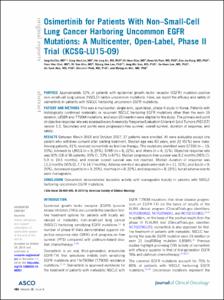KUMEL Repository
1. Journal Papers (연구논문)
1. School of Medicine (의과대학)
Dept. of Internal Medicine (내과학)
Osimertinib for Patients With Non-Small-Cell Lung Cancer Harboring Uncommon EGFR Mutations: A Multicenter, Open-Label, Phase II Trial (KCSG-LU15-09)
- Keimyung Author(s)
- Park, Keon Uk
- Department
- Dept. of Internal Medicine (내과학)
- Journal Title
- Journal of clinical oncology : official journal of the American Society of Clinical Oncology.
- Issued Date
- 2019
- Volume
- 38
- Issue
- 5
- Abstract
- Purpose:
Approximately 10% of patients with epidermal growth factor receptor (EGFR) mutation-positive non-small-cell lung cancer (NSCLC) harbor uncommon mutations. Here, we report the efficacy and safety of osimertinib in patients with NSCLC harboring uncommon EGFR mutations.
Patient and methods:
This was a multicenter, single-arm, open-label, phase II study in Korea. Patients with histologically confirmed metastatic or recurrent NSCLC harboring EGFR mutations other than the exon 19 deletion, L858R and T790M mutations, and exon 20 insertion were eligible for the study. The primary end point of objective response rate was assessed every 6 weeks by Response Evaluation Criteria in Solid Tumors (RECIST) version 1.1. Secondary end points were progression-free survival, overall survival, duration of response, and safety.
Results:
Between March 2016 and October 2017, 37 patients were enrolled. All were evaluable except one patient who withdrew consent after starting treatment. Median age was 60 years, and 22 (61%) were male. Among patients, 61% received osimertinib as first-line therapy. The mutations identified were G719X (n = 19; 53%), followed by L861Q (n = 9; 25%), S768I (n = 8; 22%), and others (n = 4; 11%). Objective response rate was 50% (18 of 36 patients; 95% CI, 33% to 67%). Median progression-free survival was 8.2 months (95% CI, 5.9 to 10.5 months), and median overall survival was not reached. Median duration of response was 11.2 months (95% CI, 7.7 to 14.7 months). Adverse events of any grade were rash (n = 11; 31%), pruritus (n = 9; 25%), decreased appetite (n = 9; 25%), diarrhea (n = 8; 22%), and dyspnea (n = 8; 22%), but all adverse events were manageable.
Conclusion:
Osimertinib demonstrated favorable activity with manageable toxicity in patients with NSCLC harboring uncommon EGFR mutations.
- Keimyung Author(s)(Kor)
- 박건욱
- Publisher
- School of Medicine (의과대학)
- Citation
- Jang Ho Cho et al. (2019). Osimertinib for Patients With Non-Small-Cell Lung Cancer Harboring Uncommon EGFR Mutations: A Multicenter, Open-Label, Phase II Trial (KCSG-LU15-09). Journal of clinical oncology : official journal of the American Society of Clinical Oncology., 38(5), 488–495. doi: 10.1200/JCO.19.00931
- Type
- Article
- ISSN
- 1527-7755
- Source
- https://www.ncbi.nlm.nih.gov/pmc/articles/PMC7098834/
- Appears in Collections:
- 1. School of Medicine (의과대학) > Dept. of Internal Medicine (내과학)
- 파일 목록
-
-
Download
 oak-2019-0463.pdf
기타 데이터 / 696.35 kB / Adobe PDF
oak-2019-0463.pdf
기타 데이터 / 696.35 kB / Adobe PDF
-
Items in Repository are protected by copyright, with all rights reserved, unless otherwise indicated.